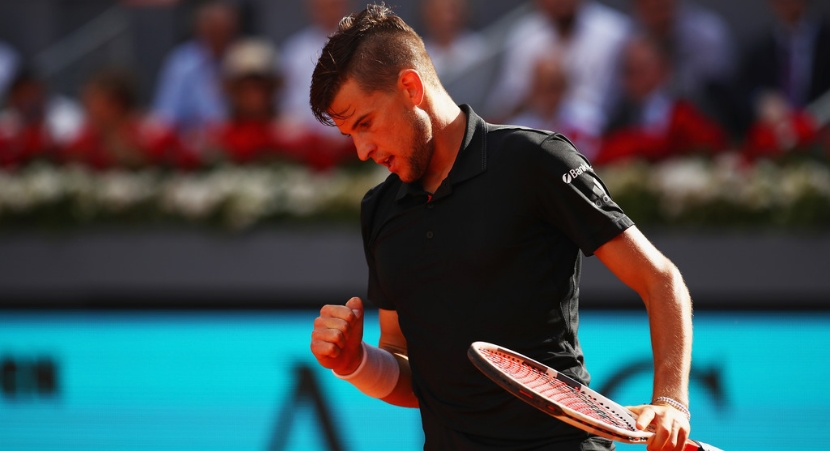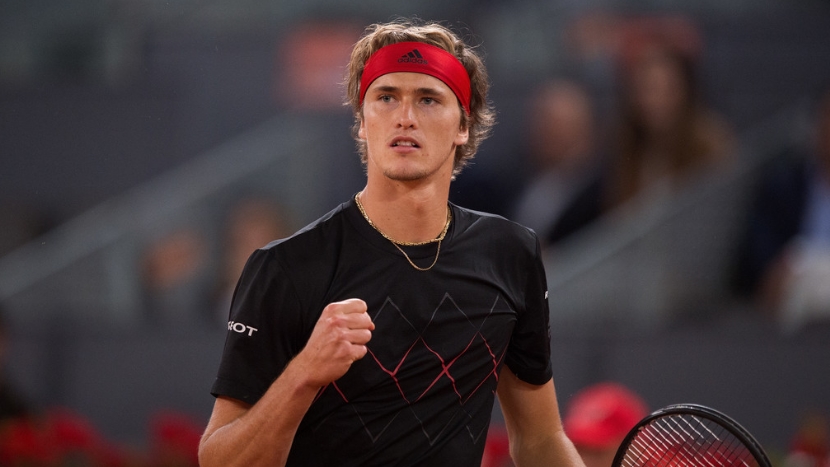Alexander Zverev def. Dominic Thiem 6-4 6-4
In the aftermath of Rafael Nadal’s loss in the quarterfinals of Mutua Madrid Open, an encounter between Alexander “Sascha” Zverev and Dominic Thiem is about the highest-profiled final that tournament organizers in Madrid could have hoped to see on stage. If you had to count the best five clay-court players in the ATP outside of Rafa, both players would probably figure in your top-five list. It promised to be a baseline slug-fest.

I doubt however that many people expected one of them to have disastrous starting game on his serve after seeing these two at peak form for a large portion of the week.
Zverev took advantage of two unforced errors and a double fault by Thiem, complementing that with return winner of his own, to break the Austrian’s serve. Then, he comfortably held to confirm the break and go up 2-0. Early breaks have played a prominent role in the outcome of almost every set played from the quarterfinals forward. Thiem found himself in a position to break that pattern if he wanted to stay in the set.
Zverev had other ideas of course. He kept his errors to a minimum, mostly playing deep and not targeting spots too close to the sidelines. For example, his sharp backhand cross-court, usually a potent weapon, was relegated to the background during this stretch. The idea – I suppose – was to keep pushing Thiem back and make him force the issue from far behind the baseline. In contrast, Sascha often stepped inside the baseline and struck a few hard and flat shots directly at Thiem in an attempt to rush him, or sneak in a few drop shots to catch him off guard.
Thiem steadied the boat on his service games but he could not shake all the errors out of his system. Sascha’s tactic was apparently working. He maintained his break advantage all the way to 5-4, losing only three points on his service games despite only serving at 56% of his first serves in. If you are wondering why Thiem was not attempting to nail a few returns for winners on those second serves, I am too.
Sometimes a successful tactic can instantly turn into a dangerous habit and bite you in the back if you stick to it too many times. It is true that Zverev was winning plenty of points by playing deep to the middle part of the court and staying away using risky lines, but when you get a short sitter inside the court on your favorite wing – backhand for the German – and you decide to approach behind it, you need to put your opponent on the run. Zverev did not**. He hit a high-paced backhand approach that went straight to Dominic’s backhand. The Austrian got it low to Sascha’s feet first and passed him on the next shot.
** See the game point at 3-2 in the second set for an example of what he should have done in that same position.
Zverev then aimed for the sideline on forehand down-the-line and missed it wide, swaying away from the plan that has been working until that point in the set. Just like that, following two tactical errors in succession, Sascha trailed 0-30 on his service game and found himself in dangerous territory on his serve for the first time in the set. That is when his first serve came to the rescue. He won four out of the next five points on powerful serves that either did not come back in the court or forced a defensive return out of Thiem, allowing Zverev to put the ball away. He won the set 6-4 on a forehand winner.
In case anyone has not yet figured it out, Zverev is a great front-runner. He seems to tune in far better with the lead than most other players do. I should spend a paragraph foregrounding the nuance to avoid misunderstanding, so here it is.
I am not saying Zverev plays better with the lead than when trailing. Although true, that is nothing more than a score-related confidence and it is valid for almost any other player holding a significant lead. I am rather making the distinction that Sascha performs better with the lead in comparison to how other players perform when they have the same type of lead. That is the nuance. This is probably because Zverev has a tendency to lose his poise when falling behind or after committing critical errors in neck-to-neck positions – more than most other players at his level do when faced with the same situation. His body language shows it, he expresses it verbally, and his level drops significantly, more than that of other players in similar positions.
Hence, transitioning back to the match recap, the alarms bells began ringing loudly for Thiem when he lost his serve again to start the second set. Once again, it was enough for Zverev. No need to go into details because everything progressed much in the same way as the first set, with the 3-2 game being the only one in which Thiem was able to reach deuce on his opponent’s serve. Zverev closed the curtains on him with a score of 6-4 6-4, without ever facing a break point on his service games.

For those who doubt Zverev’s potential, this week should have been enough, even in their mind, to place Sascha, along with Thiem, into that small group of players – behind Nadal, naturally – with a legitimate chance to win Roland Garros. It should also tilt the explanation for Zverev’s lack of success in Majors toward one of an “oddity” at this point, rather than one of “insufficiency.”
The next step of evolution for the 21-year-old German is to be a threat to go deep in the Majors (he has yet to reach the second week of a Major). It should not delay much longer. Roland Garros, the Major played on what seems to be Zverev’s favorite surface, emerges as a tremendous opportunity for him to vie for an elite spot in our sport.
Oh wait, there is still Rome! The grind on the professional tour, I tell ya’…

Mert,
What’s happening with the joker. I know he has been injured for a while and struggling to find form, however I think there’s more to it than just that.
For example, is he struggling mentally or does he not have the hunger anymore. What’s your opinion?
Also do you think Novak will ever find his old form again and starting winning some majors??
Umit
Injuries are a drag (his is a complicated one too), and in his case, it led to mental struggles too, which is completely understandable. I don’t believe that there is a hunger problem.
Yes, I do tend to think he will be back. I have learned not to count the elite athletes of our sport out after long absences. The few times I did in the past, they proved me wrong 🙂